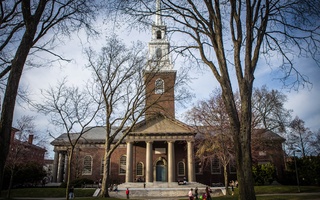With signs reading “Ambition,” “Bold,” and “Diverse,” several black students at Harvard answered the question of what being black meant to them in a single word for a new photo and video campaign called “#HarvardBlackIs.”
“The project basically entails to teach people that the word ‘black’ is not a monolith, and there are many different, diverse aspects to black and blackness,” said Nehizena K. Edosomwan ’17 , who founded the project. “What we were trying to do was enforce positive images and the social commentary on self-love.”
In addition to posing for a photograph while holding a sign emblazoned with their chosen word, participants offered a longer statement, expanding on what that word means to them personally. A major theme of this project is the recognition of the individuality of experience, Edosomwan said.
The project is in the process of expanding “#BlackIs” beyond Harvard’s campus with other schools—including Spelman, Morehouse, and Boston University—that will be releasing their own versions of the project soon.
The project launched online a few weeks ago, and Edosomwan said he has met with representatives from Harvard’s Office of Student Life and Office for the Arts with the goal of continuing the discussion on campus.
Cyrus M. Motanya ’17, the vice president of the Black Men’s Forum, chose to use the word “unique” for the project, adding that “I define who Black is because I define who I am.”
One message of the campaign is to counter preconceived notions of what it means to be black, according to Montoya. “The idea behind it can even be represented by [Edosomwan],” he said. “He is a six-foot-nine, black, male athlete. But unless they talk to him and get to know him they won’t know that he studies Chinese.”
When Edosomwan began working on the project two years ago, he sought the advice of professors Henry Louis Gates, Jr., and S. Allen Counter, two prominent African American figures on campus.
“I just wanted to make sure that if I was going to do this project, it was going to be done to the best of my ability and something that people like them would be proud of,” said Edosomwan, a prominent member of the Harvard men’s basketball team.
In a press release introducing the campaign, organizers said the project developed in the midst of difficulties for the black community “from Charleston to Baltimore,” emphasizing the need to reaffirm and empower people of color.
“The #BlackIs movement was a part of being more aware of the things that black people as a whole were and are going through in America,” said Gabriel Onor, social chair of the Nigerian Students Association.
—Staff writer R. Blake Paterson can be reached at blake.paterson@thecrimson.com. Follow him on Twitter @BlakePat95.Read more in College News
Petition Calls for Administrators To Control Final ClubsRecommended Articles
-
Women's Rugby Splits Squad for Senior Day TournamentOn Saturday afternoon, snow flurries may have delayed the start of the Crimson Sevens women’s rugby tournament, but the wintry weather couldn’t keep the host team from lighting up the scoreboard beneath the bubble of Harvard Stadium.
-
For GrandmaWhen black people get killed, my white Facebook friends from home get to be upset about riots. They get to post videos of black people weeping, and shouting, and setting shit on fire and call it foolishness, quietly tsk-ing their tongues and shaking their heads from the safety of their dorm rooms. They get to believe the newscasters and feel bad for all those poor, poor windowpanes and police cars and doorknobs that are clearly the main victims of police brutality. Meanwhile, I’m starting to look a lot like my grandma, rocking silently in front of my laptop as she did in front of the radio, or the stove, waiting for all her babies to come home.
-
"Black Sea" Surfaces with Quality Acting"Black Sea" does not offer anything new, but it offers the old quite well: a stellar performance from Jude Law brings this submarine thriller safely to port.
-
 BSA Hosts First-Ever Black Convocation
BSA Hosts First-Ever Black Convocation -
Why Non-Blacks Rapping the “N-Word” Is Cultural AppropriationWhen non-black individuals vocalize the n-word, a reminder of the malice associated with its roots remains, and elicits a strong sense of unease from many black persons who witness its expression.













